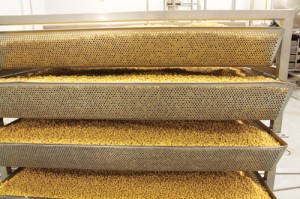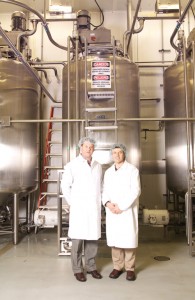Walking through the manufacturing facility at Cedar’s Mediterranean Foods is a little like visiting Willy Wonka’s hummus factory, if he had ever built one.
Written by Alexandra Pecci
Photographs by David Lier
The sprawling Ward Hill plant bangs and whirs as hummus is squeezed into plastic containers and sent down conveyor belts. There’s a 20-foot silo filled with olive oil and huge, 2,000-pound bags of dry chickpeas waiting to be steamed and squashed.
What started in 1981 with founder Abe Hanna making hummus in his home kitchen has blossomed into a more than $50 million enterprise, with products that can be found on grocery store shelves from coast to coast. With Abe’s son Charlie and Charlie’s best friend Steve Tsakirellis at the helm since the 1990s, Cedar’s not only makes hummus, but also other Mediterranean products like salads, tzatziki, dips, and spreads at its Ward Hill headquarters in Haverhill.
Cedar’s has taken advantage of consumer interest in healthy, natural foods, especially the “Mediterranean Diet,” which focuses on whole grains and healthy fats. According to Tsakirellis, Americans have grown tired of diet fads and having to sacrifice flavor and satiety for health.
“We found a way to incorporate health and taste and offer the American consumer something authentically unique,” Tsakirellis says. “Something they didn’t have to sacrifice taste for and didn’t have to feel guilty about eating.”
Throughout its nearly 30-year history, Cedar’s has retained its North Shore roots and “mom and pop” attitude towards business; it’s the only major hummus company that isn’t owned or backed by a corporate parent. Although it means less red tape when it comes to decision making and product development, it also means going head to head with companies that can afford to spend millions on advertising. For example, Sabra Dipping Company, Cedar’s main competitor, is partially owned by PepsiCo and recently started an ad blitz with TV, print, and online spots.
Yet even without national advertising dollars at its disposal, Cedar’s is continuing to grow. According to Cedar’s CFO Chris Gaudette, the company has grown at an average of about 20 percent annually and moved into a 100,000-square-foot facility in Ward Hill a few years ago. Numbers like that make advertising seem almost beside the point. Cedar’s products are getting critical acclaim as well. The company won the 2008 American Masters of Taste “Gold Superior Taste” award for its hummus, pita chips, and tzatziki.
“People are picking up our product, and they’re just loving it. They’re advertising for us,” says Nick Scangas, Cedar’s general manager. “The product is selling itself.”
That’s not to say publicity isn’t important. Cedar’s recently started a grassroots community marketing campaign that aims to get people to actually try its food, says Aimee Tsakirellis (Steve’s daughter), director of marketing. The company showcases its products at food shows and gives away free samples at New England Patriots’ home games in Foxboro. Cedar’s also donates food and money to local community organizations and received the 2009 Best of Haverhill Award in the Food Products
Manufacturers category by the US Commerce Association.
Yet being privately owned isn’t the only thing that makes Cedar’s unique. Details like those 2,000-pound bags of dry chickpeas set Cedar’s even further apart from the competition.
“We do things a lot differently here,” says Scangas. Where other manufacturers buy their chickpeas already cooked and canned in brine, Cedar’s hummus starts with dry chickpeas, which are soaked and steamed onsite. Cedar’s dips and spreads are made with strained Greek yogurt that’s actually produced in Greece. Scangas says strained yogurt that’s made in the US doesn’t have the body or flavor of yogurt made in Greece.
“I’m Greek, and I’ve eaten it all my life,” he says. “There’s definitely something about that Greek yogurt that’s special.” So to achieve a more authentically Mediterranean flavor, Cedar’s makes the strained yogurt for its dips and spreads at a facility that it established in early 2009 on the Greek island of Lesbos.
 Using dry chickpeas and real Greek yogurt not only makes the products tastier but healthier too, the company says. According Tsakirellis, the company aims to introduce healthy Mediterranean foods to American palates. He says Cedar’s employees, many of whom have Mediterranean roots, know how the food should taste and have a knack for incorporating American flavors into traditional fare.
Using dry chickpeas and real Greek yogurt not only makes the products tastier but healthier too, the company says. According Tsakirellis, the company aims to introduce healthy Mediterranean foods to American palates. He says Cedar’s employees, many of whom have Mediterranean roots, know how the food should taste and have a knack for incorporating American flavors into traditional fare.
“Americans have always known that the Mediterranean produces some of the best food,” Tsakirellis says. “But now Cedar’s offers a unique, Americanized twist on Mediterranean flavors.” For example, the company’s original and garlic hummus is made alongside flavored varieties like lemon, horseradish, and roasted chili pepper. Its five flavors of tzatziki include celery chive and artichoke spinach, with additional flavors in the pipeline.
“We always stay ahead of the customer,” says Tony Nammour, chef and vice president of operations. Nammour has been with Cedar’s for 27 years, and he and Cedar’s chefs develop new recipes like salads the company introduced in 2008 and 2009, which included chickpea, roasted corn, and edamame salads.
“They are constantly producing new products to catch the eye of the consumer and keep the Mediterranean food category fresh,” Tsakirellis says. “We are a nationally distributed company, but with every taste, the consumer will feel as though we made the product just for them.”
In some cases, the products are made just for customers. Scangas says Cedar’s works with its grocery store customers to develop new products, such as the orzo and feta salad, which Cedar’s developed at the request of a wholesale club. “If they have an idea, we’ll develop it for them,” he says. And if a customer wants a product similar to one that’s on the market, Cedar’s will happily oblige. “They come to us. We can usually do a better job with it.”
Scangas says the company can usually respond to requests for new products within a week. In general, other new products are pitched and developed quickly. Although the chefs pay attention to what’s popular among consumers, ideas for new products are often homegrown. For example, Scangas found a recipe in a magazine for black-eyed pea salad, and Cedar’s is now developing its own version. “Any one of our people can do this,” he says of pitching new products.
Taste tests seem just as informal, with small taste panels assembled among Cedar’s employees, who suggest changes like more salt or less garlic. But there’s nothing informal about Cedar’s quality controls. Lab testing-both internal and independent-confirms that the products meet health standards. They also test for nutrition information, and if lab tests show that a new product has too much fat or sodium, for example, the chefs go back to the drawing board.
 Cedar’s keeps its operations top-notch on the manufacturing side, too. The company is busy implementing the Safe Quality Food Program, which Scangas says is becoming the standard for food production across the world. It independently certifies that a company’s food is safely produced and handled throughout the entire supply chain.
Cedar’s keeps its operations top-notch on the manufacturing side, too. The company is busy implementing the Safe Quality Food Program, which Scangas says is becoming the standard for food production across the world. It independently certifies that a company’s food is safely produced and handled throughout the entire supply chain.
“It’s the most stringent quality code that exists today,” Scangas notes. Since several big customers require it of food manufacturers, “It opens up our doors dramatically for new business,” he says.
And Cedar’s appears ready to meet that new business with a continual stream of new products. Although hummus remains the cornerstone of its business, Gaudette says the company isn’t content with just being known as a hummus maker. Instead, they want to be known as a manufacturer of “fine Mediterranean cuisine.”
“We search every corner of the world for only the finest, most authentic ingredients, simply because we know the food and love it, and we know Americans will too,” Tsakirellis says. “There is no such thing as impossible in the Cedar’s kitchen. Our chefs will search every village in all corners of the world to find the best recipe and most unique ingredients for the perfect product.”

